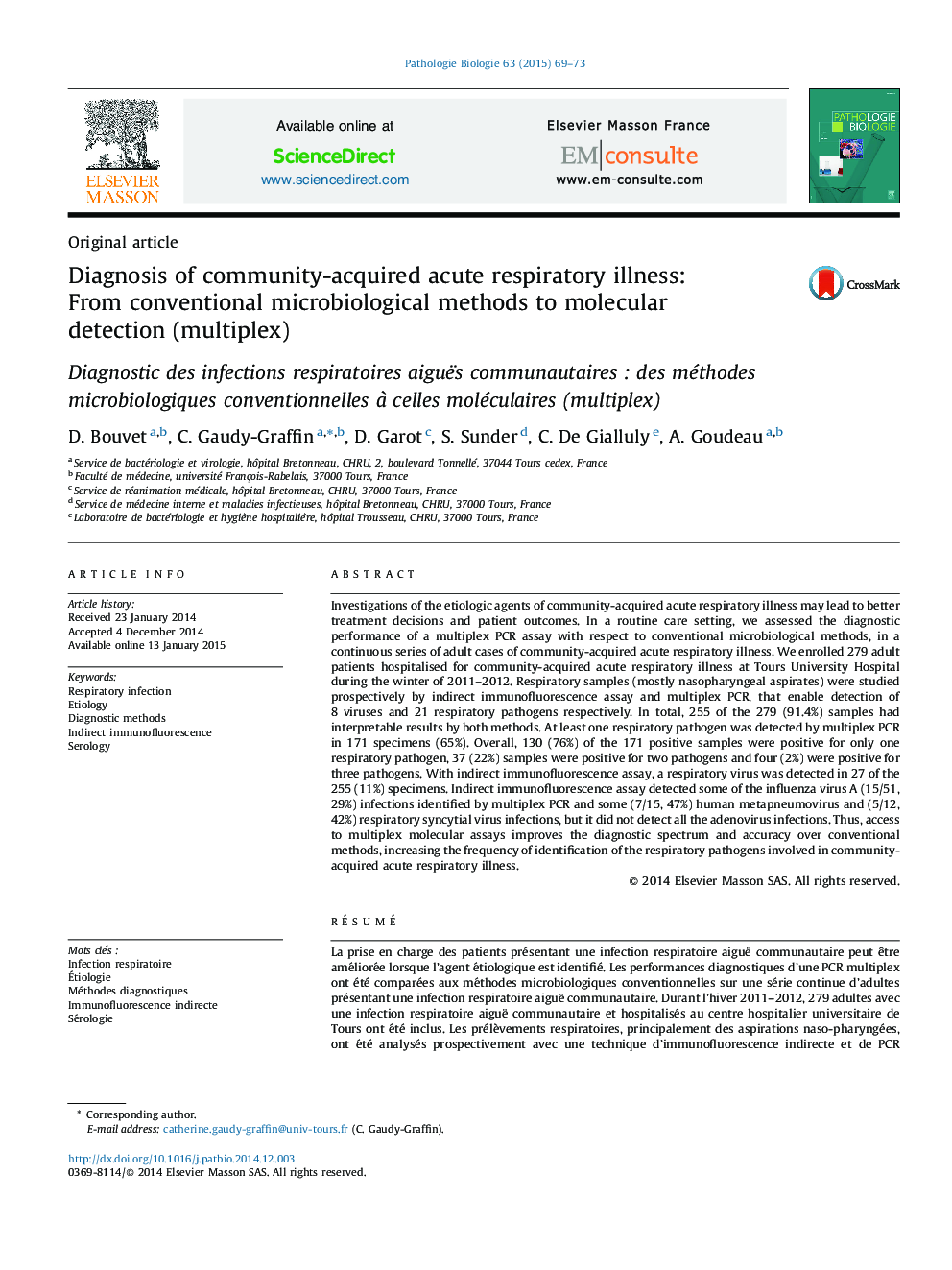| کد مقاله | کد نشریه | سال انتشار | مقاله انگلیسی | نسخه تمام متن |
|---|---|---|---|---|
| 4135874 | 1271880 | 2015 | 5 صفحه PDF | دانلود رایگان |
Investigations of the etiologic agents of community-acquired acute respiratory illness may lead to better treatment decisions and patient outcomes. In a routine care setting, we assessed the diagnostic performance of a multiplex PCR assay with respect to conventional microbiological methods, in a continuous series of adult cases of community-acquired acute respiratory illness. We enrolled 279 adult patients hospitalised for community-acquired acute respiratory illness at Tours University Hospital during the winter of 2011–2012. Respiratory samples (mostly nasopharyngeal aspirates) were studied prospectively by indirect immunofluorescence assay and multiplex PCR, that enable detection of 8 viruses and 21 respiratory pathogens respectively. In total, 255 of the 279 (91.4%) samples had interpretable results by both methods. At least one respiratory pathogen was detected by multiplex PCR in 171 specimens (65%). Overall, 130 (76%) of the 171 positive samples were positive for only one respiratory pathogen, 37 (22%) samples were positive for two pathogens and four (2%) were positive for three pathogens. With indirect immunofluorescence assay, a respiratory virus was detected in 27 of the 255 (11%) specimens. Indirect immunofluorescence assay detected some of the influenza virus A (15/51, 29%) infections identified by multiplex PCR and some (7/15, 47%) human metapneumovirus and (5/12, 42%) respiratory syncytial virus infections, but it did not detect all the adenovirus infections. Thus, access to multiplex molecular assays improves the diagnostic spectrum and accuracy over conventional methods, increasing the frequency of identification of the respiratory pathogens involved in community-acquired acute respiratory illness.
RésuméLa prise en charge des patients présentant une infection respiratoire aiguë communautaire peut être améliorée lorsque l’agent étiologique est identifié. Les performances diagnostiques d’une PCR multiplex ont été comparées aux méthodes microbiologiques conventionnelles sur une série continue d’adultes présentant une infection respiratoire aiguë communautaire. Durant l’hiver 2011–2012, 279 adultes avec une infection respiratoire aiguë communautaire et hospitalisés au centre hospitalier universitaire de Tours ont été inclus. Les prélèvements respiratoires, principalement des aspirations naso-pharyngées, ont été analysés prospectivement avec une technique d’immunofluorescence indirecte et de PCR multiplex, permettant de détecter respectivement 8 virus et 21 pathogènes respiratoires. Au total, pour 255 des 279 (91,4 %) échantillons, les résultats étaient interprétables avec les deux techniques. Au moins un pathogène respiratoire a été détecté grâce à la PCR multiplex dans 171 échantillons (65 %). Parmi ces échantillons, 130 (76 %), 37 (22 %) et 4 (2 %) échantillons étaient respectivement positifs pour un, deux et trois pathogènes. Avec la technique d’immunofluorescence indirecte, un pathogène respiratoire a été détecté dans 27 des 255 échantillons (11 %). Seulement certaines infections détectées par la PCR multiplex ont été identifées avec la technique d’immunofluorescence indirecte : virus influenza A (15/51, 29 %), metapneumovirus (7/15, 47 %) et virus respiratoire syncytial (5/12, 42 %). Aucune des infections à adenovirus n’a été détectée avec cette technique. Comparé aux méthodes de diagnostic conventionnelles, l’accès à une technique de PCR multiplex augmente la fréquence de détection de pathogènes respiratoires impliqués dans les infections respiratoires aiguës communautaires.
Journal: Pathologie Biologie - Volume 63, Issue 2, April 2015, Pages 69–73
